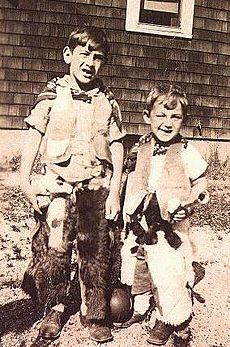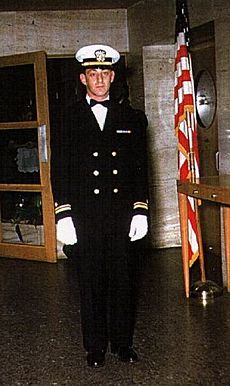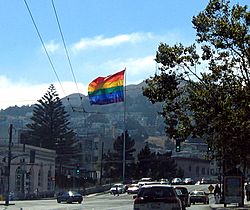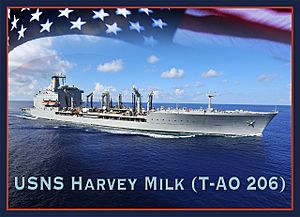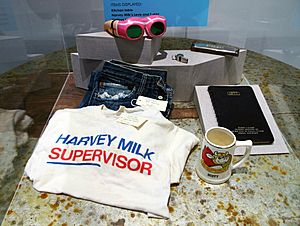Harvey Milk facts for kids
Quick facts for kids
Harvey Milk
|
|
|---|---|
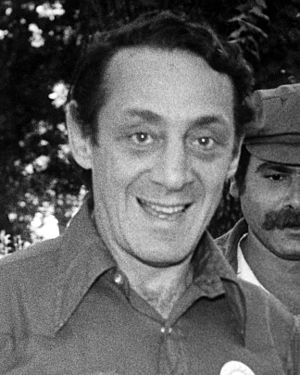
Milk in June 1978
|
|
| Member of the San Francisco Board of Supervisors from the 5th district |
|
| In office January 8, 1978 – November 27, 1978 |
|
| Preceded by | Constituency established |
| Succeeded by | Harry Britt |
| Personal details | |
| Born |
Harvey Bernard Milk
May 22, 1930 Woodmere, New York, U.S. |
| Died | November 27, 1978 (aged 48) San Francisco, California, U.S. |
| Cause of death | Assassination |
| Political party |
|
| Relatives | Stuart Milk (nephew) |
| Education | State University of New York, Albany (BA) |
| Awards | Presidential Medal of Freedom (2009, posthumously) |
| Military service | |
| Allegiance | United States |
| Branch/service | United States Navy |
| Years of service | 1951–1955 |
| Rank | Lieutenant (junior grade) |
| Unit | USS Kittiwake (ASR-13) |
Harvey Bernard Milk (May 22, 1930 – November 27, 1978) was an American politician and the first openly gay man to be elected to public office in California, as a member of the San Francisco Board of Supervisors.
Early life
Milk was born in the New York City suburb of Woodmere, to William Milk and Minerva Karns. He was the younger son of Lithuanian Jewish parents and the grandson of Morris Milk, a department store owner who helped to organize the first synagogue in the area. As a child, Harvey was teased for his protruding ears, big nose, and oversized feet, and tended to grab attention as a class clown. While he was in school, he played football and developed a passion for opera.
Milk graduated from Bay Shore High School in Bay Shore, New York, in 1947 and attended New York State College for Teachers in Albany (now the State University of New York at Albany) from 1947 to 1951, majoring in mathematics. He also wrote for the college newspaper.
Сareer
After graduation, Milk joined the United States Navy during the Korean War. He served aboard the submarine rescue ship USS Kittiwake (ASR-13) as a diving officer. He later transferred to Naval Station, San Diego to serve as a diving instructor. In 1955, he resigned from the Navy at the rank of lieutenant, junior grade, forced to accept an "other than honorable" discharge and leave the service rather than face a court-martial because of his homosexuality.
Milk began teaching at George W. Hewlett High School on Long Island. In 1956, he met Joe Campbell. Growing bored with their New York lives, the couple decided to move to Dallas, Texas, but they were unhappy there and moved back to New York, where Milk got a job as an actuarial statistician at an insurance firm. Campbell and Milk separated after almost six years; it would be his longest relationship.
Milk moved to San Francisco in 1972 and opened a camera store. Although he had been restless, holding an assortment of jobs and changing addresses frequently, he settled in The Castro, a neighborhood that was experiencing a mass immigration of gay men and lesbians. He was compelled to run for city supervisor in 1973, though he encountered resistance from the existing gay political establishment. His campaign was compared to theater; he was brash, outspoken, animated, and outrageous, earning media attention and votes, although not enough to be elected. He campaigned again in the next two supervisor elections, dubbing himself the "Mayor of Castro Street". Voters responded enough to warrant his running for the California State Assembly as well. Taking advantage of his growing popularity, he led the gay political movement in fierce battles against anti-gay initiatives. Milk was elected city supervisor in 1977 after San Francisco reorganized its election procedures to choose representatives from neighborhoods rather than through city-wide ballots.
Milk served almost eleven months in office, during which he sponsored a bill banning discrimination in public accommodations, housing, and employment on the basis of sexual orientation. The Supervisors passed the bill by a vote of 11–1, and it was signed into law by Mayor George Moscone. On November 27, 1978, Milk and Moscone were assassinated by Dan White, a disgruntled former city supervisor who cast the sole vote against Milk's bill.
Despite his short career in politics, Milk became an icon in San Francisco and a martyr in the gay community. In 2002, Milk was called "the most famous and most significant openly LGBT official ever elected in the United States". Anne Kronenberg, his final campaign manager, wrote of him: "What set Harvey apart from you or me was that he was a visionary. He imagined a righteous world inside his head and then he set about to create it for real, for all of us." Milk was posthumously awarded the Presidential Medal of Freedom in 2009.
Legacy
Milk's political career centered on making government responsive to individuals, gay liberation, and the importance of neighborhoods to the city.
Milk strongly believed that neighborhoods promoted unity and a small-town experience, and that the Castro should provide services to all its residents. He opposed the closing of an elementary school; even though most gay people in the Castro did not have children, Milk saw his neighborhood having the potential to welcome everyone. He told his aides to concentrate on fixing potholes and boasted that 50 new stop signs had been installed in District 5. Responding to city residents' largest complaint about living in San Francisco—dog feces—Milk made it a priority to enact the ordinance requiring dog owners to take care of their pets' droppings.
Karen Foss, a communications professor at the University of New Mexico, attributes Milk's impact on San Francisco politics to the fact that he was unlike anyone else who had held public office in the city. She writes, "Milk happened to be a highly energetic, charismatic figure with a love of theatrics and nothing to lose ... Using laughter, reversal, transcendence, and his insider/outsider status, Milk helped create a climate in which dialogue on issues became possible. He also provided a means to integrate the disparate voices of his various constituencies." Milk had been a rousing speaker since he began campaigning in 1973, and his oratory skills only improved after he became City Supervisor. His most famous talking points became known as the "Hope Speech", which became a staple throughout his political career.
In the last year of his life, Milk emphasized that gay people should be more visible to help to end the discrimination and violence against them.
Tributes and media
The City of San Francisco has paid tribute to Milk by naming several locations after him. Where Market and Castro streets intersect in San Francisco flies an enormous Gay Pride flag, situated in Harvey Milk Plaza. The San Francisco Gay Democratic Club changed its name to the Harvey Milk Memorial Gay Democratic Club in 1978 (it is currently named the Harvey Milk Lesbian, Gay, Bisexual, Transgender Democratic Club) and boasts that it is the largest Democratic organization in San Francisco.
In April 2018, the San Francisco Board of Supervisors and mayor Mark Farrell approved and signed legislation renaming Terminal 1 at San Francisco International Airport after Milk, and planned to install artwork memorializing him. This followed a previous attempt to rename the entire airport after him, which was turned down. Officially opening on July 23, 2019, Harvey Milk Terminal 1 is the world's first airport terminal named after a leader of the LGBTQ community.
In July 2016, US Secretary of the Navy Ray Mabus advised Congress that he intended to name the second ship of the Military Sealift Command's John Lewis-class oilers USNS Harvey Milk. All ships of the class are to be named after civil rights leaders. In November 2021 the ship was launched.
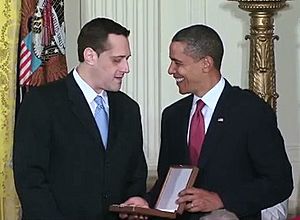
Milk's life has been the subject of a musical theater production; an eponymous opera; a cantata; a children's picture book; a French-language historical novel for young-adult readers; and the biopic Milk, released in 2008 after 15 years in the making. The film was directed by Gus Van Sant and starred Sean Penn as Milk and Josh Brolin as Dan White, and won two Academy Awards for Best Original Screenplay and Best Actor.
Milk was included in the "Time 100 Heroes and Icons of the 20th Century" as "a symbol of what gays can accomplish and the dangers they face in doing so".
In August 2009, President Barack Obama posthumously awarded Milk the Presidential Medal of Freedom for his contribution to the gay rights movement stating "he fought discrimination with visionary courage and conviction". Milk's nephew Stuart accepted for his uncle. Shortly after, Stuart co-founded the Harvey Milk Foundation with Anne Kronenberg with the support of Desmond Tutu, co-recipient of 2009 Presidential Medal of Freedom and now a member of the Foundation's advisory board. Later in the year, California governor Arnold Schwarzenegger designated May 22 as Harvey Milk Day and inducted Milk in the California Hall of Fame.
Milk was inducted in 2012 into the Legacy Walk, an outdoor public display in Chicago which celebrates LGBT history and people. He was named one of the inaugural fifty American "pioneers, trailblazers, and heroes" inducted on the National LGBTQ Wall of Honor within the Stonewall National Monument (SNM) in New York City's Stonewall Inn. Paris named a square Place Harvey-Milk in Le Marais in 2019.
See also
 In Spanish: Harvey Milk para niños
In Spanish: Harvey Milk para niños
- List of assassinated American politicians
- List of civil rights leaders
Images for kids
-
Milk, here with his sister-in-law in front of Castro Camera in 1973, had been changed by his experience with the counterculture of the 1960s. Dianne Feinstein, who first met him in 1973, did not recognize him when she met him again in 1978.
-
By the time of Milk's 1975 campaign, he had decided to cut his hair and wear suits. Here, Milk (far right) is campaigning with longshoremen in San Francisco during his 1976 race for the California State Assembly.
-
Rioters outside San Francisco City Hall, May 21, 1979, reacting to the voluntary manslaughter verdict for Dan White.


